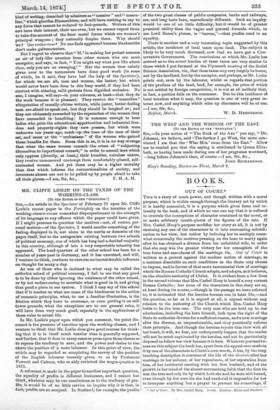MR. CLIFFE LESLIE ON THE TAXES OF THE W ORKING-CL
ASS.
[TO THE EDITOR OF THE "SPECTATOR."]
article in the Spectator of February 21 upon Mr. Cliffe L2s1ie's recent paper in the Fortnightly on the taxation of the working-classes seems somewhat disproportionate in the strength of its language to any offence which the paper could have given. If I might presume to question the motives—not, of course, per- sonal motives—of the Spectator, I would ascribe something of the feeling displayed in it, not alone to the merits or demerits of the paper itself, but to the antagonism existing between two schools of political economy, one of which has long had a decided majority in this country, although of late a very respectable minority has appeared. The head-quarters of the other school has been for a number of years past in Germany, and it has exercised, and will, I venture to think, continue to exercise no inconsiderable influence on thought for many a day.
As one of those who is inclined to what may be called the orthodox school of political economy, I fail to see that any good is to be done by either ignoring the existence of the other school, or by not endeavouring to ascertain what is good in it, and giving that good a place in our system. I think I may say of this school that if it teaches us what are some of the hindrances to the action of economic principles, what, to use a familiar illustration, is the friction which they have to overcome, or even putting it on still lower grounds, what the exceptions are to our general rules, it will have done very much good, especially in the applications of these rules to actual life.
In Mr. Leslie's paper upon which you comment, the point dis- cussed is the pressure of taxation upon the working-classes, and I venture to think that Mr. Leslie does give good reasons for think- ing that it is in itself much heavier than is generally supposed, and further, that it does in many cases so press upon these classes as to repress the tendency to save, and the power and desire to rise above the position of a mere labourer. In this point of view, the article may be regarded as completing the survey of the position of the English labourer recently given to us by Professors Fawcett and Cairnes, who so ably reviewed the wages question in 1873.
A reference is made in the paper to another important question, the equality of profits in different businesses, and I cannot but -think, whatever may be our conclusions as to the tendency of pro- fits, it would be of no little service to inquire why it is that, in fact, profits are so unequal. In Scotian I, for example, the profits
of the two great classes of public companies, banks and railways, are, and long have been, marvellously different. Such an inquiry would be one of no little difficulty, but it would be of greater practical utility than the vague and general formula which, to use Lord Bacon's phrase, is "barren,"—that profits tend to an equality.
There is another and a very interesting topic suggested by this article, the incidence of local taxes upon land. The subject is likely to be very much discussed, now that we have got a Con- servative Government. The conclusions at which Mr. Leslie has arrived as to the actual burden of these taxes are very similar to those which I put forward at the Plymouth meeting of the Social Science Association, viz., that these taxes ;nay very largely be borne, not by the landlord, but by the occupier, and perhaps, as Mr. Leslie points out, even by the labourer, whilst as regards that portion of the produce of the land, beef, for example, the price of which is not settled by foreign competition, it is not at all unlikely that, in fact, a portion falls on the consumer. But be this incidence of local taxation what it may, the question is one of very great in- terest now, and anything which stirs up discussion will be of use.
— I am, Sir, &c.,
































 Previous page
Previous page